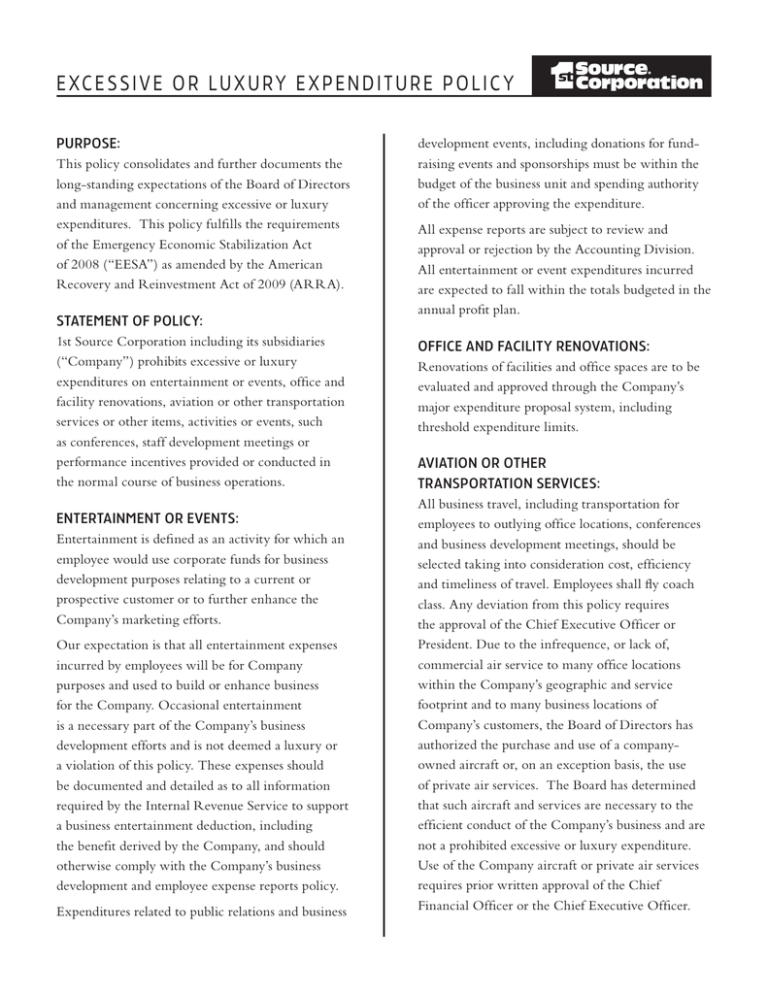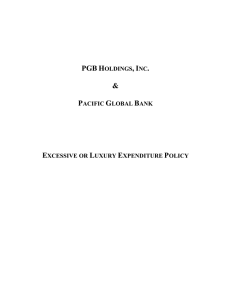excessive or luxury expenditure policy
advertisement

E xc e ssi v e o r Lu x u ry E x pe n di t u r e Po l ic y Purpose: This policy consolidates and further documents the long-standing expectations of the Board of Directors and management concerning excessive or luxury expenditures. This policy fulfills the requirements of the Emergency Economic Stabilization Act of 2008 (“EESA”) as amended by the American Recovery and Reinvestment Act of 2009 (ARRA). Statement of Policy: 1st Source Corporation including its subsidiaries (“Company”) prohibits excessive or luxury expenditures on entertainment or events, office and facility renovations, aviation or other transportation services or other items, activities or events, such as conferences, staff development meetings or performance incentives provided or conducted in the normal course of business operations. Entertainment or Events: Entertainment is defined as an activity for which an employee would use corporate funds for business development purposes relating to a current or prospective customer or to further enhance the Company’s marketing efforts. Our expectation is that all entertainment expenses incurred by employees will be for Company purposes and used to build or enhance business for the Company. Occasional entertainment is a necessary part of the Company’s business development efforts and is not deemed a luxury or a violation of this policy. These expenses should be documented and detailed as to all information required by the Internal Revenue Service to support a business entertainment deduction, including the benefit derived by the Company, and should otherwise comply with the Company’s business development and employee expense reports policy. Expenditures related to public relations and business development events, including donations for fundraising events and sponsorships must be within the budget of the business unit and spending authority of the officer approving the expenditure. All expense reports are subject to review and approval or rejection by the Accounting Division. All entertainment or event expenditures incurred are expected to fall within the totals budgeted in the annual profit plan. Office and Facility Renovations: Renovations of facilities and office spaces are to be evaluated and approved through the Company’s major expenditure proposal system, including threshold expenditure limits. Aviation or Other Transportation Services: All business travel, including transportation for employees to outlying office locations, conferences and business development meetings, should be selected taking into consideration cost, efficiency and timeliness of travel. Employees shall fly coach class. Any deviation from this policy requires the approval of the Chief Executive Officer or President. Due to the infrequence, or lack of, commercial air service to many office locations within the Company’s geographic and service footprint and to many business locations of Company’s customers, the Board of Directors has authorized the purchase and use of a companyowned aircraft or, on an exception basis, the use of private air services. The Board has determined that such aircraft and services are necessary to the efficient conduct of the Company’s business and are not a prohibited excessive or luxury expenditure. Use of the Company aircraft or private air services requires prior written approval of the Chief Financial Officer or the Chief Executive Officer. Company employees who by virtue of position have a need for reliable, safe, quality transportation may be provided a Company vehicle. Such employees shall be designated by the Chief Executive Officer. Employees who travel extensively as a result of customer calling or management of a multilocation operation and who travel in excess of 20,000 business miles per year on average may be provided a vehicle. Specific vehicle acquisitions and dispositions shall be approved in writing by the Chief Financial Officer and shall be within the purchase criteria specified in the Company’s automobile policy. Other Similar Items, Activities or Events: Conventions, Seminars and Conferences. The Company encourages employees to attend conventions, seminars and conferences (“Events”) that are appropriate business development or educational opportunities subject to written approval of the employee’s group/division head. These Events should be related to the financial services industry or to a customer’s business and have a direct correlation to the employee’s job. The expenses of spouses attending Events will be paid by Company only upon the prior written approval of the Chief Executive Officer, President or Executive Vice President. Board/Management Retreats. Retreats should only be held for educational or business planning purposes and should be kept in consideration and looked at, in the same view and discretion as all other expenses. Board and employee education are a vital part of maintaining and keeping a dynamic director and employee base. Employee Recognition/Holiday Parties. The Company views employee recognition and holiday events as part of an employee appreciation program. These events should be local in geographic nature and may include costs for such things as service awards and nominal door prizes. Memberships, Dues and Subscriptions. Reimbursement for business development membership fees or assessments should coincide with the club memberships policy. All such memberships are subject to written approval of the Chief Executive Officer or President. Dues to professional and civic organizations, subscriptions to journals, reference materials, etc. require written approval from the group/division head. Professional and civic memberships and subscriptions must have a specific business relationship to the employee’s job in order to be reimbursed. All expenses incurred for these similar items, activities or events are expected to fall within the totals budgeted in the annual profit plan. Policy Violations: All policy violations are to be promptly reported to the Chief Auditor in accordance with the employee reporting procedures posted on the Company’s intranet. Certifications: The Company’s Chief Executive Officer and Chief Financial Officer are required to certify annually that the approval of any expenditure that required the approval of any senior executive officer or board member was properly obtained. Accountability: The Chief Executive Officer or his designee shall be responsible for oversight of adherence to this policy and any disciplinary action in response to violations of this policy. Adopted July 30, 2009


